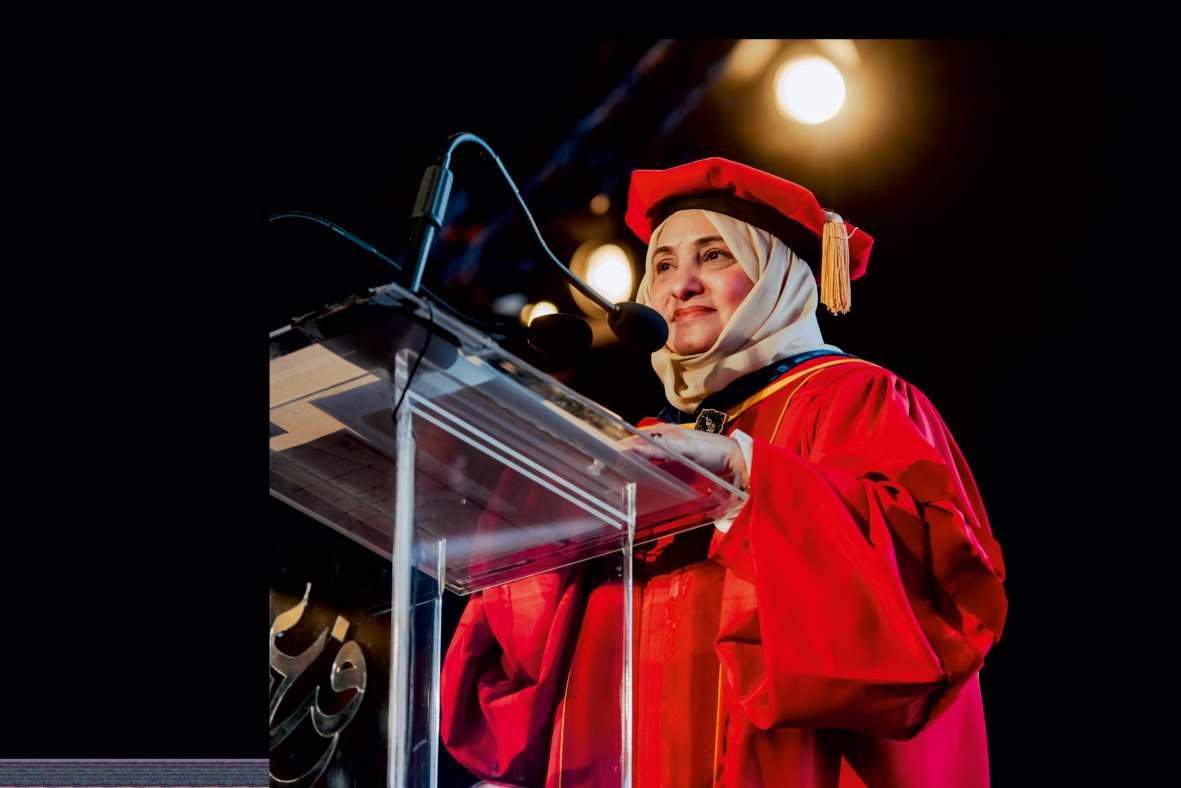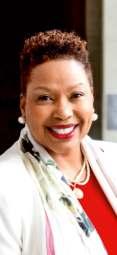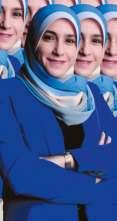Transcending Novelties for Future Generations





Editor’s Editor’s Note Note


Transcending Novelties for Future Generations






The field of education has been shaped by numerous remarkable women who have made significant contributions to the advancement of knowledge, learning, and the development of future generations. These women have dedicated their lives to improving educational practices, advocating for equal opportunities, and inspiring others to pursue knowledge and personal growth.
These women have excelled in various roles within the education sector, including educators, researchers, administrators, policymakers, and advocates. They have demonstrated exceptional leadership, innovation, and a deep commitment to the betterment of education at all levels. Through their remarkable achievements, these women have paved the way for transformative changes in teaching methods, curriculum development, and educational policies.
Furthermore, these admired leaders are playing an instrumental role in promoting inclusive education, breaking down barriers, and championing the rights of marginalized groups. They have fostered environments that prioritize diversity, equity, and social justice, ensuring that every student has an equal opportunity to learn and thrive.
Their contributions extend beyond traditional educational settings, as they have made a significant impact on educational policymaking, educational technology, research, and the global discourse on education. These women have been trailblazers, empowering others and inspiring future generations of educators and learners.
It is important to recognize and celebrate the accomplishments of these admired women in the educational sector. By doing so, Insights Success honors
their dedication, resilience, and invaluable contributions to the advancement of education. Their work serves as a source of inspiration, reminding us of the transformative power of education and the profound impact individuals can have on shaping the future through their commitment to learning and enlightenment.
With this latest edition entitled “ The Most Admired Women in Educational Sector , 2023 ,” we will delve into the stories and accomplishments of these exceptional women, highlighting their unique contributions, inspiring leadership, and lasting legacies within the education sector. Their stories serve as a testament to the potential for change and progress that lies within the field of education, as well as the transformative power of individuals who are passionate about making a positive difference in the lives of others.

Join us as we explore the journeys and achievements of the most admired women in the educational sector, recognizing their profound influence and the enduring impact they have had on shaping the educational landscape for the better.
Flip through the pages and have a delightful read!






Transcending Novelties for Future Generations



Featured Person
Reda Jamal AlLai President
Tanja Schjellerup Founder and CEOBrief Company Name
Tougaloo College tougaloo.edu
Effat University effatuniversity.edu.sa
Dr. Walters brings a blended set of skills and over 24 years of leadership in curriculum and policy development, fundraising, student enrollment and retention management, team building, conflict resolution, strategic planning, and organizational management.
Dr. Haifa is a distinguished leader, respected academic, renowned advocate of youth engagement, and author of several articles; having also delivered many keynote speeches on women's education in the Middle East, women and change, entrepreneurship and business.
Javaune Adams-Gaston is the seventh President of Norfolk State University. Norfolk State University nsu.edu
Zayed University tougaloo.edu

Dr Sanaa Kaddoura holds a PhD in computer science from Beirut Arab University, Lebanon. She is currently employed as an Assistant Professor of Computer Science at Zayed University, United Arab Emirates.
Skolen Online skolenonline.dk
With a vision to build a foundation for a global company, Tanja figured out how to be a leader and run a business with employees.
Dr. Carmen J. Walters President Dr. Haifa Javaune Adams-Gaston President Sanaa Kaddoura Assistant Professor of Computer ScienceDr. Haifa is a distinguished leader, a respected academic, a renowned advocate of youth engagement, and the author of several articles.


Empowerment begins with chalk and a blackboard. That may be why people who seek to change the world covet education and people who want to keep the status quo that suits them seek to curtail it.
An old African proverb says, “If you educate a man, you educate an individual. But if you educate a woman, you educate a nation.” Women leaders are playing a pivotal role in transforming and empowering a nation and enabling betterment for future generations. One such woman inspiring and empowering the generations is Dr. Haifa Reda Jamal Al Lail, President of Effat University.
Dr. Haifa is a distinguished leader, a respected academic, a renowned advocate of youth engagement, and the author of several articles. She has also delivered many keynote speeches on women’s education in the Middle East, women and change, entrepreneurship and business.
In 2005, Dr. Haifa was one of the recipients of 1000 Women for the Nobel Peace Prize. It was awarded to peace activists from around the globe in order to give more visibility and recognition to women’s peace work worldwide. For her exceptional work, Dr. Haifa has also received awards such as the Innovation Award, Saudi Sayidaty, Queen Effat’s Distinction Award, Leading Woman CEO, Distinguished Arab Woman Award, World Family Summit Award, and the Distinguished Arabian Woman Award.
In an exclusive interview with Insights Success , Dr. Haifa shares how she is transforming lives globally with her work.
Below are the highlights of the interview:
Briefly describe your professional journey up until now.
I am currently serving as the President of Effat University, a premier institution of higher education located in Jeddah, Saudi Arabia. Throughout my career, I have been a leading voice in the education community, advocating for education reform and promoting the importance of education for the development of the country.
I have published numerous articles on various topics, including women empowerment and privatization, and have been involved in education reform in Saudi Arabia since 1991. My work in this field has been widely recognized, and in 2005, I was nominated for a Nobel Peace Prize as part of the 1,000 PeaceWomen campaign, a global
movement to recognize the contributions of women in peace and social justice work. I received my Ph.D. in public policy from the University of Southern California.
What challenges did you face along the way?
Effat University’s journey has been one filled with both challenges and successes. At the start, we faced significant obstacles, but with the support of our Board of Founders, Board of Trustees, and members of the academic and administrative bodies, we were able to overcome them.
The early days were difficult, but we remained focused on our ambitious goals and were able to move forward steadily. From a single college consisting of two academic departments, we have now grown into a university with four colleges and 12 bachelor’s degree programs, as well as four master’s programs.
At Effat University, we take pride in being a leading research center in the Kingdom that brings together researchers from different fields to build and expand our knowledge base, which contributes to the future of Saudi Arabia. We are committed to becoming a prestigious research institution in the coming years through continued investment and development in this field.
Today, the university is home to four advanced research centers: the Smart Building Research Center, the Virtual Reality Research Center, the Electronic Arabization Research Center, and the Innovation and Entrepreneurship Research Center. Each of these centers is designed to provide a safe and comfortable environment for researchers to conduct studies in the field of social and physical sustainability.
As President of Effat University, I must balance cultural norms with the demands of reform and change in society. My international studies exposed me to the importance of diversity and inclusivity in building strong communities, which is something that is crucial in the education industry today.
At Effat University, we strive to provide innovative solutions to meet changing social challenges and to develop leaders and scholars who contribute to the legacy of Queen Effat Al-Thunayan’s vision (may God rest her soul).
What significant impact have you brought to the education industry?
As a distinguished leader in the field of education in Saudi Arabia, I have made significant contributions to the promotion of education and the improvement of the education system in the country. My efforts have been instrumental in providing students with the necessary skills and knowledge to succeed in their future careers. I have implemented several innovative programs and initiatives that have helped to raise educational standards and improve student outcomes. My commitment to excellence and my passion for education has made me a role model for others in the field.
Additionally, I have been an active voice in the education community, advocating for education reform and promoting the importance of education for the development of the country. My contributions to the education system in Saudi Arabia have been widely recognized and have earned me numerous awards and accolades for my work.
Can you tell us about the foundation pillar of Effat University?
The foundation pillar of Effat University is rooted in the values of excellence, innovation, and social responsibility. The university’s mission is to provide education that contributes to scientific discovery, technological advancement, and the resolution of societal challenges. Effat University also places a strong emphasis on international cooperation and partnerships, which allow the university to provide global quality education to its students. Effat University offers a wide range of undergraduate and graduate programs in areas such as engineering, business, and the humanities.
In summary, Effat University’s foundation pillar is to provide a world-class education that is grounded in excellence, innovation, and social responsibility and that prepares students to become leaders and change-makers in their respective fields. The university also values the importance of international cooperation and partnerships in order to achieve global quality in its educational programs.
 The Most Admired Women In Educa�onal Sector, 2023
The Most Admired Women In Educa�onal Sector, 2023
How does Effat University promote workforce flexibility, and what is your role in it?
wide range of fields, including engineering, business, and the humanities, and it collaborates with industry leaders to develop new technologies, processes, and systems that will help to improve the workforce.
Effat University also promotes workforce flexibility by building partnerships with industry leaders, which allows it to stay abreast of the latest trends, technologies, and best practices in the workforce. As the President of Effat University, we play a key role in promoting workforce flexibility by leading initiatives that provide students with a broad range of skills and knowledge through academic programs, conducting research to develop new technologies and best practices that improve the efficiency and effectiveness of the workforce, and building partnerships with industry leaders to stay abreast of the latest trends and technologies in the workforce.
What is your take on technology’s importance, and how are you leveraging it?
I believe technology is crucial to improving the efficiency, effectiveness, and competitiveness of the workforce. As the President of Effat University, I am leveraging technology through research initiatives that focus on developing new technologies, processes, and systems that will help to improve the efficiency, effectiveness, and competitiveness of the workforce. Additionally, we are leveraging technology by building partnerships with industry leaders, which allow her to stay abreast of the latest trends, technologies, and best practices in the workforce.
What will be the next significant change in the education industry, and how are you preparing for it?
It is difficult to predict exactly what the next significant change in the education industry will be, as it is constantly evolving and adapting to new technologies, changing student demographics, and global policy changes. However, educators and educational institutions need to be flexible and adaptable and be willing to incorporate new technologies and approaches into their teaching methods. Additionally, educational institutions and educators need to be aware of the needs of diverse student populations and be prepared to meet those needs. At Effat University, the leadership is continuously monitoring the changes in the education industry and adapting accordingly to ensure that students receive the best education possible.
What are your goals in the upcoming future?
Our wise leadership has emphasized transforming from an economy dependent on oil to an economy with diversified sources, which is the economy of knowledge. And the Kingdom embarked on its journey towards achieving this goal, as this is evident in the enormous investments that the Kingdom directed to the education sectors, initiatives to nurture the gifted and build qualified national capacities in the scientific, technical, and knowledge fields, and other areas that pour in this direction.
What advice would you like to give the next generation of aspiring business leaders?
I would like to advise the next generation of aspiring business leaders to approach their work with seriousness and commitment, to be proud of their cultural identity, and to continuously strive to educate and develop themselves, not just in their field of specialization but in all areas such as the arts, culture, sports, and more. They should aim to become responsible and active members of Saudi society, as well as global citizens. Additionally, they should focus on learning from others, be patient, develop analytical thinking skills, and find innovative ways to apply them to new challenges. Furthermore, they should serve humanity in all they do.
Dr. Haifa is a distinguished leader, a respected academic, a renowned advocate of youth engagement, and the author of several articles.


















Garnering various experiences from diverse fields and gradually shaping herself to be a leader in the educational sector, Dr. Carmen J. Walters has come a long way.
As the President of Tougaloo College , Dr. Carmen aims to promote its mission to prepare its students to be lifelong learners committed to leadership and service in a global society through its diverse undergraduate and graduate programs.

Tougaloo College is accessible to everyone and is keen on making students aware of its rich legacy as an independent, historically black liberal arts institution
Dr. Carmen J. Walters President Tougaloo Collegeaffiliated with the United Church of Christ and Christian Church.
We caught up with Dr. Carmen and discussed her personal and professional journey, future goals, and much more.
Below are the highlights of the interview:
Briefly discuss your career path as a staunch woman leader up until your current position.
My career spans more than 25 years, including recruiting, grant writing, strategic planning, fundraising, budgeting, mentoring, and leadership development. Every position has prepared me to become a college president. Working at a Historically Black College and University (HBCU) enables me to apply many leadership principles, including nurturing students to ensure their success. I push myself to connect to students in a way that provides them comfort and confidence as they make Tougaloo College their home.
My path as a staunch woman leader was like other black female leaders—complex and filled with insurmountable challenges. Nonetheless, I always relied on my strong upbringing through all the challenging times. My challenges center around the consecutive loss of family members, including my husband and daughter simultaneously having cancer.
I experienced the tragic death of my husband and the miracle of my daughter’s remission from cancer within 12 months. These challenging experiences strengthened me and contributed to my understanding of my inner self and strengths.
My parents had 13 children and worked hard to take care of us. We were never on welfare and understood that we had to work for what we wanted. My father’s favorite saying was, “children, don’t give up until you are dead and covered up!” My father’s grandmother used to say this statement to him and his siblings, and he told it to us consistently.
My father’s grandmother was born into slavery and was freed at the age of 12 and already married. Her name was Charlotte, and in her later years, she lived with my father and his parents until her death. She made sure my father
and his siblings knew what it was like to be enslaved, so she made them promise they would take advantage of their freedom. Although he was a young boy when she died, he never forgot her teachings and shared them with us.
Through all my challenges, tragedies, and successes, I depend on Charlotte’s strength, resilience, tenacity, and faith to do the work I am called to do.
What significant impact have you brought to the educational sector?
In higher education at the senior executive level, women often lack mentors to help them be successful. I benefitted from a thoughtful mentor who shared knowledge and support, allowing me to grow professionally and personally. I am committed to mentoring female leaders to help them navigate a complex environment and avoid hurdles that prohibit them from being successful in achieving their goals.
Founded in 1869, Tougaloo College, a Choctaw word that means where two streams converge, academic excellence and social justice, is a private historically black college and one of the leading HBCUs in the United States. Tougaloo's role in the Civil Rights Movement, operating as a “safe haven” for activists to meet, organize, and strategize, changed the landscape of Mississippi and the nation.
Our plan represents our stakeholders’ voices committed to ensuring that Tougaloo continues to live its mission of preparing students to thrive and contribute to a changing world.
Living our mission of academic excellence and social justice, we continue to prepare students to graduate fully capable of answering the call to leadership, meeting the challenges of informed citizenship, and excelling in their chosen professions as difference-makers in a global marketplace.
What methodologies do you implement that contribute to new growth opportunities?
Forge strategic partnerships with educational institutions, corporations, foundations, and organizations that support the College’s mission delivery enhance our students’ academic experiences, expand opportunities, provide pathways to employment, generate revenue, and help raise the institution's respected profile.

What is your take on technology's importance, and how are you leveraging it?
The challenges of the 21st century forced Tougaloo to reimagine technology to improve teaching and learning, provide better services, communicate effectively with internal and external stakeholders, and offer personalized learning experiences tailored to meet the needs of students. The College recently outsourced its IT services to the world’s largest technology company to ensure the infrastructure and accountability framework for integrating information and overseeing the implementation of an IT governance structure and strategic technology plan, charting a path to the future.
What will be the next significant change in the educational sector, and how are you preparing for it?
Technology is constantly evolving, and the Net Generation demands to control their knowledge attainment on their own time and from anywhere. Therefore, the institution is transitioning to more digital learning platforms to promote collaborative learning, share content, and create virtual spaces to enhance students’ learning experiences in and out of the classroom.
What are your goals in the upcoming future?
Tougaloo College launched its 2021-2026 strategic plan, Preserving the Past, Advancing Tomorrow, a comprehensive road map focused on the following strategic goals: enrollment growth, student success, philanthropic giving, alum engagement, economic development, strategic partnerships, and technology. Our plan represents our stakeholders’ voices committed to ensuring that Tougaloo continues to live its mission of preparing students to thrive and contribute to a changing world.

What advice would you like to give the next generation of aspiring leaders?
Transformative leadership begins with an understanding of self, revolves around responsibility, accountability, and dependability, and they have a role to play in creating a just, sustainable, and inclusive society.


Effective educational leadership is instrumental in driving positive change, fostering a culture of excellence, and ensuring the success of students and the entire educational community. Educational leaders play a crucial role in shaping policies, implementing effective instructional practices, and creating a supportive environment that nurtures student achievement. This article explores key strategies that educational leaders can employ to enhance their leadership skills and create an environment conducive to growth and success.
Cultivate a Shared Vision :
A shared vision serves as a guiding force that aligns stakeholders towards a common purpose. Collaborate with staff, students, parents, and community members to develop a shared vision that reflects their aspirations and values. Communicate the vision effectively and consistently, inspiring all stakeholders to work together towards its realization. Regularly revisit and refine the vision to ensure its relevance and maintain a collective sense of ownership.
Lead by Example :
Effective leaders lead by example, setting high standards and demonstrating the behaviors and qualities they expect from others. Model professionalism, integrity, and a strong work ethic. Display a commitment to continuous learning by seeking professional development opportunities and staying abreast of current research and best practices. Show empathy, respect, and active listening skills when interacting with staff, students, and the community.
Developing strong relationships is crucial to effective educational leadership. Foster a supportive and collaborative environment by building positive relationships with staff, students, parents, and community members. Create opportunities for open and honest communication, encouraging feedback and valuing diverse perspectives. Establish trust by being accessible, approachable, and responsive to concerns and needs.
Empower and Delegate :
Effective leaders empower others by fostering a culture of trust and delegating responsibilities. Recognize the strengths and talents of individuals within the educational community and provide them with opportunities to take on leadership roles and make meaningful contributions. Delegate tasks appropriately, allowing others to grow and develop their skills while promoting a sense of ownership and shared responsibility.
Invest in the professional development of staff members to enhance their skills and knowledge. Provide resources and support for ongoing learning opportunities, such as workshops, conferences, and mentorship programs. Encourage collaboration and the sharing of best practices among teachers and staff members. Foster a culture of continuous improvement and innovation.


Effective leaders make data-informed decisions to drive improvement. Implement systems for collecting and analyzing relevant data, such as student assessments, attendance records, and feedback from stakeholders. Use data to identify areas of strength and areas in need of improvement. Collaborate with staff members to develop data-driven strategies and interventions that support student growth and achievement.
A positive and inclusive school climate is essential for student success and staff morale. Implement strategies to promote a safe, respectful, and supportive environment for all. Address issues of bullying, discrimination, and inequities proactively. Celebrate achievements, recognize and value diversity, and promote a sense of belonging among students and staff.
Effective educational leaders actively engage families and the broader community. Establish partnerships with parents, community organizations, and local businesses to support student learning and well-being. Involve families in decision-making processes, seek their input, and communicate regularly about student progress and school initiatives. Leverage community resources to provide additional learning opportunities for students.

Effective leaders embrace innovation and adaptability in response to changing educational landscapes. Stay informed about emerging trends, technologies, and pedagogical approaches. Encourage experimentation and the use of innovative teaching methods that engage students and foster critical thinking and creativity. Foster a culture that supports risk-taking and continuous improvement.
Acknowledge and celebrate the achievements of students, staff, and the educational community. Recognize outstanding contributions and efforts through awards, ceremonies, and public appreciation. Celebrate milestones and share success stories to inspire others and maintain motivation and enthusiasm.
Invest in developing instructional leadership skills among administrators and teachers. Provide professional development opportunities focused on instructional strategies, curriculum design, assessment practices, and differentiation. Foster a collaborative environment where instructional leaders can share expertise, mentor new teachers, and engage in ongoing professional learning communities.
Create a positive and supportive staff culture that promotes collaboration, trust, and shared goals. Provide opportunities for professional collaboration, such as grade-level or subject-area teams, where teachers can share resources, discuss best practices, and problem-solve together. Encourage a growth mindset among staff members, valuing their contributions and recognizing their professional growth.

The final advice is integrity. Make sure you do the correct thing, whether somebody is looking or not. Whatever you do will return back to you. So, act with integrity.
Sanaa Kaddoura, Assistant Professor of Computer Science Zayed University

In today's fast-paced world, where technology is
advancing every day, universities must have a faculty that is up-to-date with the latest trends in the industry. For that reason, many prestigious universities have appointed highly competent professionals to deliver stateof-the-art education to their students.
In this regard, Sanaa Kaddoura, the Assistant Professor of Computer Science at Zayed University, stands out as a remarkable example of expertise and dedication. She is an accomplished researcher, a seasoned teacher and a visionary leader in the field of computer science. With years of experience and an unquenchable thirst for knowledge, Sanaa has become a vital member of the university's faculty.
Sanaa's expertise, dedication and passion for teaching and research make her a valuable asset to the university and a respected member of the academic community.
Sanaa shared insights on her approach to integrating new methods in teaching to increase efficiency in education.
Let's indulge in the significant facts she shared!
Sanaa is not just a leader by position but also by her actions. Currently, Sanaa leads a research team in her lab where they conduct cutting-edge research on applying Artificial Intelligence to solve real-life problems. Her team consists of 3 researchers working on two distinct projects, and she makes sure to lead them in the most efficient way possible to produce great results together.
Back in her professional journey, her first remarkable leadership action was recognized in 2012 while working at OBAS, an e-learning company. Her manager noticed her
decision-making abilities and the initiative to empower new colleagues and support existing ones with her knowledge. This led to her promotion from a curriculum creator to a Team Leader. Though the responsibility became higher, Sanaa enjoyed it and excelled in her new position.
In 2015, Sanaa moved to the UAE and had to re-establish and prove herself again in a new environment. Her first position allowed her to challenge herself to fix a companywide computer system that was not functioning at the time. She created a new ad-hoc system by herself that could produce reports in a timely fashion. Although it was not her job, Sanaa took on the work as a programmer, administrator and data entry operator to get the reports once.
In support of this, she says, " Although it was stressful, the results were satisfying enough and helped me to discover more about the hidden leader inside me. "
As a university professor, Sanaa's job as an educator is a leadership position as well. Every semester, she has new learners who expect a lot from her, and she never disappoints or lets them down. As an educator, Sanaa wakes up every morning ready to lead her class and make an impact.
Sanaa believes that leadership is an action, not just a position, and her actions speak louder than words. Her ability to empower others, take on challenges, and lead her team with efficiency makes her a true leader.
The vision of Zayed University is " To enable leaders capable of shaping the future, passionate about knowledge and innovation, keen on self-development and ready to anticipate future challenges as inspired by Sheikh Zayed's timeless legacy ."
Zayed University's values focus on Pioneering, Passion for knowledge, Innovation, Competitiveness, Tolerance, and Institutional Reputation
Zayed University supports research and encourages faculty and students to engage in research projects. The university also provides all the needed assets for that, including funds, a library, resources, etc.
Throughout her educational and professional experiences, Sanaa has noticed the high demand for specific skills and knowledge in the market, especially in the education industry. As a result, she has made it a priority to emphasize these skills in her courses and prepare her students to meet the demands of the industry.

Currently, Sanaa is leading a research project that explores the required skills in the marketplace, particularly in the era
of Artificial Intelligence. The project aims to develop a system that can benefit the education industry by allowing universities to assess their curriculums and ensure they equip educators with the necessary skills. The system is expected to be launched soon, and Sanaa is optimistic about its potential impact on the education industry.
Sanaa is a firm believer in the positive impact of technology on education. Her passion for this topic is reflected in the numerous research and magazine articles she has written on the subject. In her classes, Sanaa ensures that technology is an integral part of the learning process.
She utilizes online Learning Management Systems (LMS) for all resources, communication, announcements, and exams. Sanaa also incorporates online and gaming tools to increase learner engagement and help students avoid rote learning. Her classes are visually stimulating and she makes
use of online simulations, videos, images and gaming tools to make the learning experience more exciting.
Zayed University, where Sanaa teaches, supports faculty members with the latest technologies and provides them with the necessary training, enabling Sanaa to take full advantage of technology in her classes.

Artificial Intelligence and the newly demanded skills in the market will cause a revolution in the education sector. All institutions must go through a transformation stage to keep up with the market need. Sanaa says, " If this does not happen, we will have a problem with many jobless graduates with university degrees because they do not have the required skills. "
In order to keep pace with the industry 4.0 demand, Zayed University changed its programs to new ones that can prepare a new generation of graduates who are creative thinkers, doers and future builders of the nation. The new programs are interdisciplinary, innovative and up-to-date.
Sanaa has always been passionate about making a positive impact on society through her work. As a faculty member at Zayed University, her primary goal is to support the university's mission and vision while pursuing her passion for research and teaching. She further shares, " I aim to lead more research projects that directly impact society. I dream of using my research skills and IT competencies to serve humankind. ”
She also emphasizes sustainability stating, " I believe that life and science can interact together, and we can all use our skills to help find solutions to the critical problems we are facing globally. ”
One of Sanaa's main areas of interest is sustainability. She believes that collaborative research between different fields of study, such as IT, health science, and social science, can help find solutions to the critical problems faced globally, such as global warming. Sanaa is keen to explore how IT skills can be utilized to serve the goal of sustainability. In her previous research project, she utilized Artificial Intelligence to predict water quality and she is now expanding her work to cover more problem areas.
Sanaa is excited about the potential impact of her research and hopes to lead more research projects that directly impact society. She believes that through collaborative research and the utilization of modern technologies, it can be efficient to find solutions to critical problems and make a positive impact on society. Sanaa is grateful for the support and resources provided by Zayed University, which enable her to pursue her passion for research and make a meaningful contribution to society.
Sanaa believes in the power of advice and guidance in shaping a person's life. She follows certain principles that guide her to stay motivated and focused on achieving her goals.
One of the most critical pieces of advice she follows is to " stay up-to-date " continually. She emphasizes that the new industry will be skills-based rather than degree-based, and staying up-to-date with the latest skills and competencies is crucial to succeed. She often assesses herself on how many skills she has, rather than how many degrees she holds, to stay competitive in the job market.
The second piece of advice she follows is to " believe in yourself " and not get obsessed with negative thoughts. She tells a story of a deaf frog who could not hear people telling him that he could not do it. Sanaa advises everyone to be like the deaf frog and not get disheartened by negative thoughts or comments.
Finally, Sanaa emphasizes the importance of integrity. She advises them to always do the correct thing, whether someone is looking or not because whatever one does will ultimately return to us. She believes that acting with integrity not only builds trust and respect but also helps us lead a fulfilling life.

Educational leadership plays a vital role in shaping

the future of educational institutions. A strong and effective leader must possess a clear vision that guides their decision-making, inspires stakeholders, and fosters a culture of excellence and innovation. Developing a vision for educational leadership requires careful reflection, collaboration, and a forward-thinking mindset. This article explores the key steps and considerations involved in creating a compelling vision that drives positive change in educational settings.
To develop a vision for educational leadership, it is essential to assess the current state of the institution. This involves gathering data, analyzing performance indicators, identifying strengths, weaknesses, opportunities, and threats. Reflect on the organization's mission, values, and goals. Consider the broader educational landscape, emerging trends, and challenges. This reflective process provides a foundation for envisioning a desirable future.
Developing a vision should be a collaborative process involving all stakeholders: teachers, administrators, students, parents, and community members. Engage them in dialogues, focus groups, and surveys to gather diverse perspectives. This inclusive approach fosters a sense of ownership and shared responsibility for the vision.
Encourage stakeholders to envision their ideal educational environment and identify common values and aspirations.
Define Core Values and Beliefs :
A compelling vision is rooted in core values and beliefs that guide the educational community. Identify and articulate these values, such as equity, innovation, inclusivity, and lifelong learning. Align the vision with the broader educational principles and ethical standards. These values act as guiding principles for decision-making and serve as a moral compass for the organization.
A vision must be accompanied by ambitious yet attainable goals. Establish specific, measurable, achievable, relevant, and time-bound (SMART) objectives that align with the vision. These goals should address academic achievement, social-emotional development, and other key areas of focus. Involve stakeholders in setting goals to ensure collective commitment and buy-in.
An effective vision for educational leadership encourages collaboration and fosters a culture of innovation. Create structures and processes that facilitate collaboration among staff, students, and the wider community. Encourage experimentation, risk-taking, and the use of innovative
teaching methods and technologies. Emphasize professional development and provide resources to support continuous improvement.
A vision is only effective if it is communicated clearly and consistently. Craft a compelling narrative that conveys the vision's purpose, values, and goals. Use various communication channels such as newsletters, meetings, social media, and the school website to engage stakeholders and keep them informed about progress. Inspire others through storytelling, highlighting success stories, and recognizing the contributions of individuals and teams.
Developing a vision is an ongoing process. Regularly monitor progress, collect feedback, and assess the impact of initiatives. Celebrate successes and identify areas for improvement. Remain open to feedback and adjust the vision and strategies as needed to stay aligned with the evolving needs and aspirations of the educational community.
Ensure that your vision embraces diversity and inclusion as fundamental values. Create an inclusive environment where students, staff, and the community feel valued, respected, and represented. Incorporate cultural responsiveness and equitable practices into your vision, fostering a sense of belonging for all individuals.
Consider the skills and competencies necessary for success in the 21st century. Your vision should reflect the importance of critical thinking, problem-solving, creativity, collaboration, communication, digital literacy, and adaptability. Prepare students to thrive in a rapidly changing world by integrating these skills into the curriculum and instructional practices.
Empower students by actively involving them in the visioning process. Solicit their ideas, perspectives, and feedback. Encourage student leadership and provide opportunities for them to have a voice in decision-making processes. Foster an environment where students take ownership of their learning and contribute to the improvement of the educational community.

Recognize the importance of strong partnerships with families, community organizations, businesses, and higher education institutions. Develop strategies to engage these stakeholders in supporting the vision. Collaborate with community resources to expand learning opportunities, provide internships, and create meaningful connections between the classroom and the real world.









